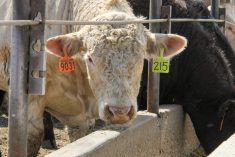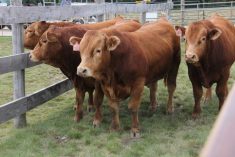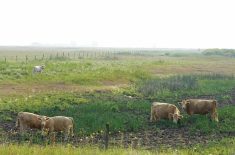An eastern Manitoba dairy farmer who began producing a specialty ice cream with the farm’s own milk in 2013 has closed shop citing rising production costs.
Lisa Dyck, owner of the Cornell Creme ice cream brand, began producing a line of hand-crafted ice cream in 2013, using milk from the family dairy farm northeast of Winnipeg between Beausejour and Anola.
Flavours with mouth-watering names such as Velvety Chocolate Truffle and Lemon Meringue and others were almost an overnight success and Cornell Creme’s full-butter fat ice cream was soon selling at premium prices in stores and restaurants across Manitoba, Saskatchewan and Ontario.
Read Also

U.S. not ready to lift Mexican cattle ban over screwworm, Agriculture Secretary Rollins says
The U.S. is not yet ready to reopen its border to Mexican cattle amid an outbreak of the flesh-eating New World screwworm parasite, Agriculture Secretary Brooke Rollins said, but she is pleased with Mexico’s efforts to contain the pest.
Their demise has nothing to do with product demand, Dyck said Tuesday after announcing her plans on social media to pull the plug.
“It’s certainly not for lack of selling product or lack of support from our customers. That’s been amazing.
“It’s production issues.”
Her troubles have been mounting as unexpected costs skyrocketed, she said.
The operation really took a hit as global supplies for natural vanilla tightened, she said. Their product used only natural vanilla but the price went from $50 up to $500/lb. after cyclones destroyed crops in Madagascar last year, where about 85 per cent of the world’s vanilla is produced.
She could have changed her recipe, as other processors using natural vanilla have done, but she was adamant that she would not, she said.
“A lot of companies do things differently. I just wasn’t willing to do it. I tried to ride the storm of the price but it’s just not coming down.”
Other costs have mounted since switching production over from the University of Manitoba’s dairy pilot plant to the federally inspected Notre Dame Creamery in January 2016 and moving to a full distribution model for the product.
A big challenge all through was doing almost all of the work herself, Dyck said.
“It was kind of the perfect storm of things happening to us,” she said.
“I just got burnt out. I just couldn’t continue.”
Closing down Cornell Creme is a painful decision and she’s been overwhelmed by the outpouring of customer support since announcing it.
In fact, it was this intensely close relationship with customers that kept her going, even probably past the point when she should have, she said.
“All those relationships we made, we made person to person. We’ve done a really good job of branding ourselves.
“It’s just sad,” she continued. “My heart is with my customers and my stores right now.”
Cornell Creme began after Dyck made a few batches of homemade ice cream with a kitchen-table ice cream maker her family gave her as a gift. The taste of the ice cream so impressed friends and family they urged her to try commercializing it.
The provincial dairy sector applauded the launch of the made-in-Manitoba ice cream company, noting it set a great example of product innovation for the industry.
The business website emphasized the Dycks’ care of their 120-cow herd, explaining the barn’s loose-housing and other production practices for herd health and well-being, such as the animals’ mattresses, ‘hoovicures’ they received twice yearly, and even posting the animals’ registered names with Holstein Canada.
Cornell Creme never became a large-scale production company in its six years of operation, and continued to use only milk from the Dycks’ own herd.
Last year the company produced over 20,000 litres of ice cream, “which is quite small for a processor,” she added.
The difficulties that led to shutting down point to how tough niche-market food processing is, and the impact unexpected spikes in costs of production can have, she said.
“You need deep pockets to do this. I think at this point it will take investors and someone willing to buy the label.”
— Lorraine Stevenson is a reporter for the Manitoba Co-operator at Carman, Man.











